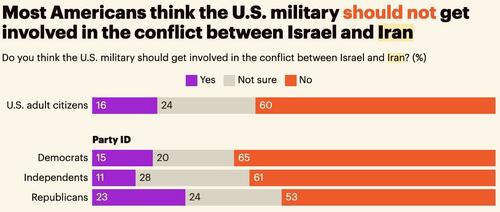As President Trump reportedly considers issuing an unconstitutional order to commit the US military to Israel's war on Iran, a new poll finds very little public support for an American attack on Iran -- even among those who voted for Trump in 2024.
According to an Economist/YouGov poll taken between June 13 and 16, only 16% of Americans "think the US military should get involved in the conflict between Israel and Iran. In an even more significant finding, only 19% of people who voted for Trump in 2024 support American military involvement. (23% of all self-identified Republicans support going to war.) Similarly, 56% of all Americans say the United States should engage in negotiations with Iran. That avenue has even greater support among Trump supporters -- with 63% advocating negotiations.

On the other hand, some of the poll's findings illustrate the effectiveness of decades of government propagandizing about Iran that's been echoed by establishment media. For example, 61% of Americans say Iran's nuclear program poses either an "immediate, serious threat" or "somewhat serious threat" to the United States. In 2007, the US intelligence community issued a National Intelligence Estimate that concluded with "high confidence" that Iran was not developing a nuclear weapon. That same conclusion has been periodically reiterated by the intelligence community ever since, including just three months ago. Similarly, 50% of Americans and 68% of Trump voters classify Iran as an "enemy" of the United States. A quarter of Americans categorize Iran as "unfriendly."
Interestingly, the poll also asked respondents to characterize Israel in the same way. Here, 10% said Israel was unfriendly and 6% called Israel an enemy; 61% said Israel was either an ally or friendly, while 23% said they were unsure. Against the top-line finding of 16% of Americans saying Israel is either "unfriendly" or an "enemy," some groups with above-average negative convictions about Israel include Hispanics (21%), 18- to 29-year-olds (21%), 30- to 44-year olds (20%), income under $50k (18%) and liberals (22%).
The finding of broad unpopularity of another US war in the Middle East comes alongside a rising chorus of voices demanding that the decision should be made by the Congress, as required by the United States Constitution. On Monday, Republican Rep. Thomas Massie and Democratic Rep. Ro Khanna introduced the "Iran War Powers Resolution" that would prohibit the US military from "unauthorized hostilities in the Islamic Republic of Iran." Also on Monday, Democratic Sen. Tim Kaine introduced a resolution in the upper chamber that would require a debate and vote before any use of force against Iran.
"The Constitution does not permit the executive branch to unilaterally commit an act of war against a sovereign nation that hasn't attacked the United States," said Massie "Congress has the sole power to declare war against Iran. The ongoing war between Israel and Iran is not our war. Even if it were, Congress must decide such matters according to our Constitution." A coalition that spans ideological lines is forming to back the resolutions, and the Ron Paul-affiliated Campaign for Liberty has posted a webpage that makes it quick and easy for citizens to urge their representative and senators to sign on.
Speaking at an April event hosted by Bucknell University's Open Discourse Coalition, Sen. Rand Paul elaborated on why America's founders vested warmaking power in the Congress:
The most important thing is -- and it doesn't sound that exciting -- it's the process. We have to have a vote. You get a vote through your representatives. It's the dispersion of power. It's trying to keep power from being centralized in one authority, and warmaking is probably the most important of that. And Madison, when he was writing about this in the "Federalist Papers," said "the executive branch is the branch most prone to war. Therefore, with studied care, we have vested that power in the legislature."
On Monday, President Trump posted a disturbingly religion-charged text sent to him by US Ambassador to Israel, zealous Christian Zionist and perpetual Iran hawk Mike Huckabee. In it, Huckabee likens Trump's position to that of President Truman in 1945 -- the year he ordered the atomic bombing of Hiroshima and Nagasaki against the convictions of America's top military leaders. Appealing to Trump's ego, Huckabee also said, "The decisions on your shoulders I would not want to be made by anyone else."
There's no doubting his sincerity on that point: Given the universally low public support of US military engagement in Israel's war, neither Huckabee nor Israel want those decisions made by the people's representatives in Congress.
Loading...